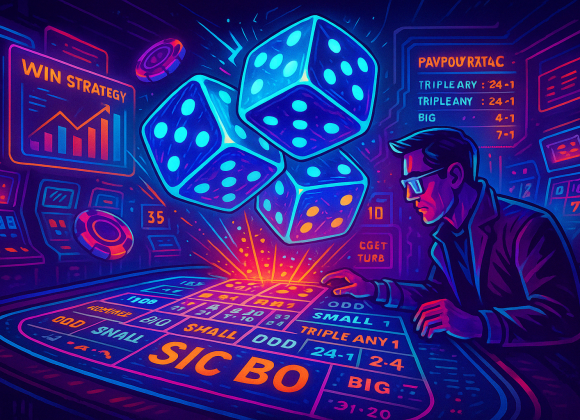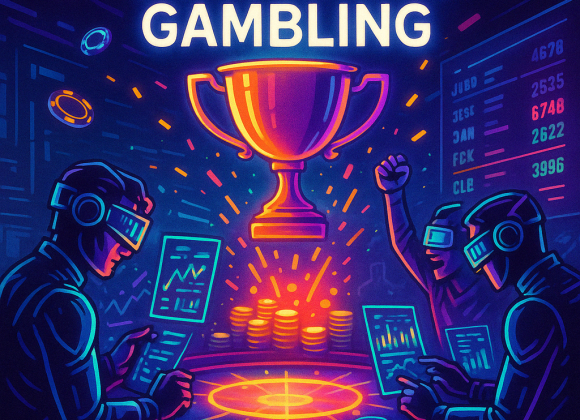Gambling has fascinated people for centuries, not only for its thrill and entertainment value but also for its underlying mathematics. Understanding the mathematics behind casino odds is essential for anyone who wishes to engage in gambling responsibly and strategically. The following sections will provide a breakdown of the mathematical principles involved in casino games, the odds associated with them, and how players can utilize this information to make informed betting decisions.
Understanding Probability: The Foundation of Casino Odds
At the core of casino odds lies the fundamental concept of probability, which quantifies the likelihood of an event occurring. In the context of gambling, this means determining the chances of winning or losing based on specific game conditions. Probability is expressed as a fraction, decimal, or percentage, allowing players to gauge their potential outcomes effectively. For example, in a simple coin flip, the probability of landing heads is 0.5 or 50%, as there are two equally likely outcomes.
Understanding probability is crucial not only for grasping the concept of odds but also for realizing that luck is not the sole factor in gambling. Instead, it is the statistical likelihood of various outcomes that dictates how games are structured. Each game in a casino, whether it be slots, blackjack, or roulette, has its own unique probabilities, which are meticulously calculated by game designers.
The concept of independence is also vital in probability. In games like roulette, each spin is independent of the previous one, meaning past results do not influence future outcomes. This principle often leads to misconceptions, as players may fall into the gambler’s fallacy—believing that a certain outcome is “due” after a streak of losses or wins. Understanding true probabilities can help players avoid these common pitfalls.
Furthermore, players should recognize that probability is not just a theoretical concept; it has practical implications for their betting strategies. By understanding the odds associated with their chosen games, players can make more informed decisions about how much to bet, when to hold back, and when to take calculated risks. This foundational knowledge transforms gambling from a mere activity of chance into a more strategic pursuit.
In summary, grasping the basic principles of probability is essential for anyone engaging with casino games. It lays the groundwork for understanding odds and the mathematical relationships between different outcomes. As players become more informed about these probabilities, they can approach gambling with a clearer, more analytical mindset.
House Edge: The Casino’s Advantage Explained
One of the most critical concepts in casino mathematics is the house edge, which represents the statistical advantage that the casino has over the players. This edge ensures that, regardless of the game, the casino will always have a long-term profit margin. The house edge varies between games, and understanding it is crucial for players who wish to maximize their chances of winning.
The house edge is typically expressed as a percentage and is calculated based on the expected return to players (RTP). For example, if a game has a house edge of 5%, this means that, on average, the casino retains 5% of all bets made over time, while 95% is returned to players. This percentage reflects the long-term outcome, meaning players may experience short-term wins or losses that deviate from this average.
Different games feature varying house edges. For instance, blackjack may have a house edge of around 1% when played optimally, while slot machines can have edges ranging from 2% to 15%. Understanding these differences is essential for players who wish to choose games that offer better odds for winning over time.
Moreover, the house edge is not only a reflection of the game’s design but also of its rules and betting structure. Certain game variations may have rules that favor the player, thereby decreasing the house edge. For example, in blackjack, the player can influence their odds by making strategic decisions like hitting or standing based on the dealer’s upcard. In contrast, games of pure chance, like slots, do not allow for any strategic input.
Players often mistakenly believe that they can “beat” the house edge through luck or superstition. However, the mathematical realities of casino odds make it clear that the house edge is a built-in aspect of gambling. Understanding this concept empowers players to make informed choices about which games to play and helps them manage their expectations regarding potential winnings and losses.
To summarize, the house edge is a vital element of casino mathematics, representing the casino’s inherent advantage over players. By recognizing the house edge in different games, players can make educated decisions that align with their gaming strategies, whether they aim for casual enjoyment or more serious gambling endeavors.
Types of Games: Variations in Odds and Payouts
Casinos feature a wide array of games, each with its own unique odds and payout structures. Understanding these variations can significantly impact a player’s chances of winning and overall experience. From table games like blackjack and poker to electronic games like slots, each game has distinct mathematical frameworks that dictate odds and payouts.
Table games typically offer better odds compared to electronic games. For instance, in blackjack, players who employ optimal strategy can achieve a house edge of less than 1%. In contrast, many slot machines can have a house edge exceeding 10%, depending on the game’s design and payout structure. Understanding these differences is essential for players looking to maximize their potential returns.
Payouts also vary significantly between games. In games like roulette, the payout for a successful bet on a single number is 35 to 1, reflecting the low probability of that outcome. Conversely, in poker, payouts can depend on the specific hand players hold, offering a range of potential winnings that can be significantly higher than the initial bet.
Moreover, within each game category, there are often variations that can impact odds and payouts. For example, in blackjack, different rule sets (e.g., dealer hits on soft 17 or surrender options) can change the house edge. Players must familiarize themselves with these variations to make strategic betting choices.
Additionally, progressive jackpots found in many slot machines can lead to larger payouts, though they typically come with higher house edges. Players must weigh the potential for big winnings against the increased risk, making informed decisions based on their preferences and risk tolerance.
In conclusion, understanding the types of games available in casinos, their varying odds, and payout structures is crucial for making informed gambling decisions. By analyzing these factors, players can select games that align with their goals and enhance their overall experience while gambling.
| Game Type | Average House Edge | Typical Payout Ratio | Strategy Influence |
|---|---|---|---|
| Blackjack | 1% | 3:2 (Blackjack), 1:1 (other wins) | High |
| Roulette | 5.26% (American) | 35:1 (single number) | Low |
| Slots | 5% to 15% | Varies, up to 10,000:1 for jackpots | None |
| Poker | Varies (based on player skill) | Varies (based on hand) | High |
Randomness and Variability: Misconceptions in Gambling
In gambling, the concepts of randomness and variability are often misunderstood. Many players believe they can predict outcomes based on previous results or patterns. However, randomness is a fundamental principle underlying casino games, particularly in games of chance such as slots and roulette.
The notion of randomness implies that each outcome is independent of previous ones. In a fair game, such as roulette, the chance of landing on red or black does not change based on prior spins. This leads to the common misconception that streaks or trends can be used to predict future outcomes, which is often referred to as the gambler’s fallacy.
Moreover, variability exists within the realm of gambling, meaning that while short-term results may fluctuate wildly, the long-term results will tend to converge on the expected probabilities. This means that even a player who experiences a winning streak may ultimately lose over time due to the house edge always being present.
Understanding randomness and variability can also help players manage their emotions and expectations. Many players experience frustration or elation based on short-term outcomes, which can cloud their judgment. By recognizing that outcomes are random and that variability is inherent in gambling, players can adopt a more rational, long-term mindset.
Additionally, this understanding can influence betting strategies. Players may choose to employ strategies that capitalize on random events, such as betting on hot or cold numbers in roulette, but they must do so with the realization that these strategies do not alter the underlying probabilities.
In summary, recognizing the role of randomness and variability in gambling is crucial for players. By understanding these concepts, they can avoid common misconceptions, manage their expectations, and make more informed decisions when placing bets.
The Role of Mathematics in Strategic Betting Decisions
Mathematics plays a pivotal role in strategic betting decisions, providing the tools necessary for players to calculate odds, expected returns, and optimal betting strategies. By applying mathematical principles, players can shift the odds in their favor, even in games primarily governed by chance.
One key mathematical concept that players can utilize is the expected value (EV). This calculation allows players to determine the potential return of a bet by considering both the probability of winning and the payout. For instance, if a bet has a 50% chance of winning a $100 payout, the expected value would be $50. Understanding EV can help players identify favorable betting opportunities and make more rational decisions.
Another important mathematical tool is bankroll management, which is essential for any serious gambler. Players should establish a betting unit based on their total bankroll and adhere to a consistent strategy, such as only betting a small percentage of their bankroll on each wager. This approach helps mitigate losses and extends the player’s time at the table, increasing the chances of hitting a winning streak.
Additionally, players can employ statistical analyses and simulations to refine their strategies. Advanced players may use software to simulate various game situations, allowing them to identify optimal plays based on specific scenarios. This analytical approach can provide a competitive edge in games like poker, where skill and strategy play a significant role.
Moreover, understanding variance and standard deviation can help players anticipate the fluctuations in their bankroll due to luck. By recognizing that results will vary greatly in the short term, players can remain disciplined in their strategies and avoid emotional decision-making during losing streaks.
In conclusion, mathematics is an invaluable asset for players looking to make strategic betting decisions in casinos. By utilizing concepts such as expected value, bankroll management, and statistical analysis, players can enhance their understanding of the games and increase their chances of achieving positive outcomes.
Making Informed Choices: How to Use Odds to Win Smart
To succeed in gambling, players must learn to make informed choices based on the odds associated with different games and bets. This involves not only understanding the numerical odds but also knowing when to leverage them for strategic advantage. By applying a combination of mathematical knowledge and personal intuition, players can enhance their gambling experience.
The first step in making informed choices is to familiarize oneself with the odds and house edge of the games available in the casino. Players should prioritize games with lower house edges, as these typically offer better long-term returns. For instance, opting for blackjack or poker instead of high-edge games like certain slots can significantly influence overall outcomes.
Additionally, players should consider their personal playing style and preferences when making choices. Some players may prefer games that require skill and strategy, while others may enjoy the thrill of pure chance. Understanding one’s strengths and preferences can guide players toward games that align with their individual approaches to gambling.
Moreover, practicing proper bankroll management is essential for making informed choices. Players should set limits on their gambling sessions, allocate funds wisely, and avoid chasing losses. By maintaining discipline and adhering to a planned budget, players can ensure that they engage in gambling as an enjoyable activity rather than a detrimental one.
Furthermore, players should be aware of promotions and bonuses offered by casinos, as these can provide additional value. Understanding the terms and conditions associated with these offers can help players maximize their potential winnings and minimize losses.
Lastly, continuous learning and adaptation are crucial in the world of gambling. Players should remain open to new strategies, technologies, and trends within the gambling landscape. By staying informed and flexible, players can make better-informed choices that enhance their chances of success.
In conclusion, to win smartly in gambling, players must learn to make informed choices based on the odds associated with various games. By prioritizing low-edge games, practicing bankroll management, and remaining adaptable, players can significantly improve their gaming experience and outcomes.
Q&A Section
Q1: What is the house edge?
A1: The house edge is the statistical advantage that a casino holds over players. It ensures that the casino will always have a long-term profit margin.
Q2: How do probabilities affect my chances of winning?
A2: Probabilities indicate the likelihood of various outcomes in a game. Understanding these probabilities helps players gauge their potential winnings and losses.
Q3: Can I beat the house edge?
A3: While you can’t eliminate the house edge, you can choose games with lower edges and employ strategic betting to improve your chances of winning.
Q4: How does randomness affect game outcomes?
A4: Randomness implies that each outcome is independent of previous results. Understanding this helps players avoid common misconceptions, such as the gambler’s fallacy.
Q5: What is expected value (EV)?
A5: Expected value is a calculation that determines the potential return of a bet based on the probability of winning and the payout, helping players make rational decisions.
Q6: Why is bankroll management important?
A6: Bankroll management helps players allocate their funds wisely, extend their playtime, and reduce the risk of significant losses, ensuring gambling remains enjoyable.




